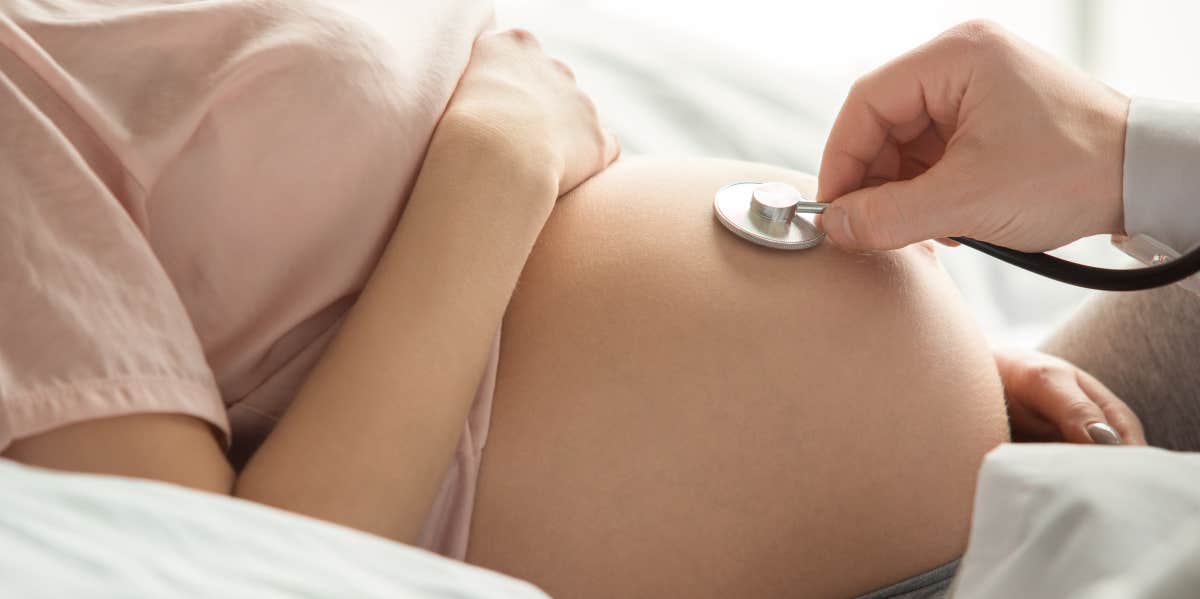OB-GYN Explains Why Pregnancy May Now Be A Death Sentence In The U.S.
The maternal mortality rate will rise.
 Friends Stock | Shutterstock
Friends Stock | Shutterstock With the Supreme Court's decision to overturn Roe v. Wade, eliminating the constitutional right to an abortion, pregnancy could now be a death sentence for many women.
Now that there are no federal protections in place, individual states have the power to decide if abortion will be legalized. Over two dozen states are certain to ban abortions in the coming weeks, with many of them not allowing for exceptions.
While the ban on abortion will greatly impact younger, low-income women of color, some of who already have children, it will also impact women who are already pregnant.
Women will die as a result of Roe v. Wade being overturned.
"The most frightening statistic now that Roe v Wade has been overturned is the death rate for women will increase," says Dr. Sherry Ross, an Obstetrician-Gynogologist, women’s sexual health expert, and author of "She-ology" and the "She-quel."
According to the CDC, for every 100,000 births in 2020, 23.8% of people died from pregnancy or childbirth-related causes, a total of 861 women.
Whether it is an ectopic pregnancy to other life-threatening complications, pregnant women are often faced with the decision to either terminate their pregnancy and live, or continue full-term and risk losing their baby along with their own life.
Those numbers are excruciatingly high when it comes to Black women alone, and have been that way long before Roe v. Wade was overturned.
Black women are three times more likely to die from a pregnancy-related complication than white women are. A report by the District of Columbia’s Maternal Mortality Review Committee found that Black people accounted for 90% of pregnancy-related deaths in DC, despite constituting only half of all births there.
In addition, Black women are also at a higher risk for pregnancy complications and postpartum issues, such as pre-eclampsia and eclampsia.
When it came to abortion-related deaths, women in those low-income and minority communities endured a disproportionate reality.
While wealthier white women were able to utilize their resources to access safe abortions regardless of state laws, minority women were forced to consider other dangerous alternatives to terminate their pregnancies.
Black and brown women were more likely to undergo low-cost and unsafe procedures conducted by unqualified medical providers.
While many states are moving to ban abortions, there are some people, like former Vice President Mike Pence, who are calling for a nationwide abortion ban.
If a nationwide ban were to happen, the results would be catastrophic, with an increase of 21% in pregnancy-related deaths across the nation, especially for women of color, which would see a rise of 33%.
"If women don’t have access to safe abortions in their states and cannot afford or want a pregnancy to go to full term, they will end up in back alleys getting coat hanger abortions putting them at risk for dangerous complications including maternal infections, hemorrhage, incomplete abortions, and death," Dr. Ross says.
"Losing Roe v Wade no longer gives women the option for safe abortions and increases the risk for these preventable complications."
Not only will maternal mortality rates rise with the Court's decision to forgo federal protection for abortions, but the criminalization of both women and doctors for seeking and performing abortions will also increase.
Doctors in states with tenuous abortion laws have already started declining treatment for women who are in the midst of miscarriages, for fear that it will be seen as abortion and they will be criminally prosecuted.
By doctors refusing to treat women, many will start turning to other methods, a fear that Dr. Ross has, as an OB-GYN herself.
"My concern is the safety of the mother and baby who will not have the option of safe abortion access," she explains.
"Instead of going to a safe, doctor-approved facility to have an elective abortion, women may look elsewhere to avoid all the red tape or time and expense to travel to a state that allows for safe abortions."
Many medical providers and organizations, including, the American Medical Association (AMA) and the American College of Obstetrics and Gynecology (ACOG), consider abortion to be safe and part of reproductive health care, according to Dr. Ross.
Taking away these resources will disproportionately affect many women across the country, especially women who have already lived in a society that doesn't value their needs.
Now that people across the U.S. are facing extreme obstacles while trying to access vital reproductive healthcare, we need to offer our support where we can.
Local abortion funds across the nation are helping to fund procedures, abortion pills, transportation and lodging when travel is required, childcare, doulas, emotional support, and more. Find your local abortion fund at AbortionFunds.org.
Or consider donating to help independent clinics keep their doors open as they face increased expenses for security, building repairs, legal fees, and community education and advocacy. Donate to clinics via KeepOurClinics.org.
Nia Tipton is a writer living in Brooklyn. She covers pop culture, social justice issues, and trending topics. Keep up with her on Instagram and Twitter.

